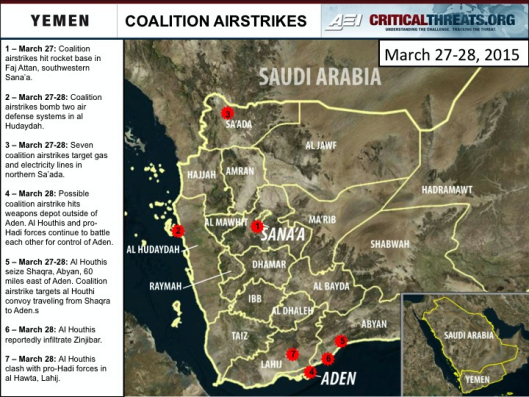Saudi Arabian-led Operation Decisive Storm continues to destroy al Houthi military targets with airstrikes. Saudi Arabia is also attempting to coordinate with military forces on the ground loyal to Abdu Rabbu Mansour Hadi to combat the al Houthis. The al Houthis have advanced into Abyan in an attempt to isolate Aden but are suffering heavy losses from airstrikes.
Saudi Arabia is coordinating with Hadi-loyal forces in Yemen to combat al Houthis on the ground. Saudi Arabian Defense Ministry Adviser Brigadier General Ahmed Asri stated that coalition forces are coordinating with pro-Hadi forces in Aden and some brigades of the Yemeni military to combat al Houthis on the ground. Hadi loyalists in the military have been sharing intelligence with Saudi forces to target al Houthi convoys and supply routes. Airstrikes targeted al Houthi weapons depots, air defense systems, and communication lines March 27-28 in Sana’a, Aden, al Hudaydah, and Sa’ada. Asri stated that the airstrikes have left Saudi Arabia in control of Yemeni airspace and that ground troops would only be deployed if?cessary.
Al Houthis militants continue to fight pro-Hadi forces for control of Aden and advance eastward into Abyan. Al Houthi militants seized the town of Shaqra, 60 miles east of Aden, on March 27, most likely in an attempt to isolate Aden and pro-Hadi forces in the city from eastern Yemen. Hadi supporters continued to fight al Houthis in Aden on March 27-28. By March 29, pro-Hadi militias regained control of Aden International Airport from the al Houthis. There are unconfirmed reports that al Houthis have also infiltrated Zinjibar, the capital of Abyan. Al Houthi and loyal military forces also clashed on March 28 with pro-Hadi forces north of Aden in al Hawta, Lahij.
Former Yemeni President Ali Abdullah Saleh may be considering turning on the al Houthis. The Saudi-owned newspaper Al Arabiya reported that Saleh’s son Ahmed Ali Abdullah Saleh offered to end support for the al Houthis two days before Operation Decisive Storm began in return for immunity for him and his father. His proposal was rejected. Former President Saleh has been instrumental in facilitating al Houthi military gains in Yemen in what appears to have been an alliance of convenience. Saleh also gave a televised address on March 28 condemning coalition operations in Yemen and blaming Hadi for the current turmoil. Saleh also called for an end to violence and for dialogue. It is unclear whether Saleh and his loyalists in the military and security forces will continue to cooperate with the al Houthis.
Iran continues to support the al Houthis rhetorically and oppose Gulf military operations in Yemen. Anonymous U.S. officials alleged that the Iranian Islamic Revolutionary Guard Corps (IRGC) had trained and equipped al Houthi military units. IRGC members reportedly trained al Houthis to use the advanced weaponry the rebels had seized from Yemen military bases. Iranian-backed Hezbollah has also publicly supported the al Houthis. Hezbollah leader Hassan Nasrallah stated on March 27 that Saudi Arabia will be defeated in Yemen and that the Yemeni people have a right to resist Saudi aggression. Former IRGC commander Mohsen Rezaei also wrote an open letter to Abdul Malik al Houthi, congratulating him on the al Houthis’ achievements and stating that the al Houthis’ actions in Yemen are part of the real “Islamic Awakening.”
Arab League members announced the formation of unified military force to confront growing security threats from Yemen to Libya. The Arab League met in Sharm al Sheikh, Egypt on March 28 to discuss the ongoing Saudi-led operation Decisive Storm in Yemen and announced that it would form a joint military force. Abdu Rabbu Mansour Hadi attended the meeting and called on the al Houthis to surrender. Saudi Arabia’s King Salman bin Abdulaziz al Saud said that the operation against the al Houthis would continue until Yemen is secure. UN Secretary General Ban Ki-moon urged leaders to resolve the conflict in Yemen peacefully.
The U.S. continues to support Saudi-led operations in Yemen. The U.S. military is providing Saudi military planners with surveillance intelligence for airstrikes. Saudi Arabia has reportedly also asked the U.S. to provide more bombs for the strikes and for refuel air tankers. The U.S. also helped rescue on March 28 two Saudi pilots who had ejected over the Red Sea after their plane suffered technical failures.
Continued airstrikes against the al Houthis have destroyed Yemen’s air defense systems and will likely now target al Houthi weapons depots and military convoys. Should former President Saleh end his support for the al Houthis, the group will be in a significantly weaker position and may not be able to maintain their territorial gains south of Sana’a. Both al Qaeda in the Arabian Peninsula (AQAP) and the Islamic State in Iraq and al Sham (ISIS) will likely be able to take advantage of the security vacuum in southern and eastern Yemen in order to expand.

